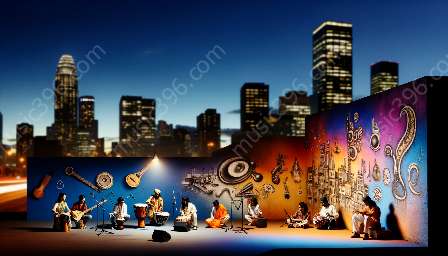Ethnomusicology and ethnography offer unique and insightful perspectives into the diverse musical cultures of the world. From the study of traditional music to the exploration of contemporary sonic expressions, the intersection of ethnomusicology and ethnography opens doors to understanding the social, cultural, and historical aspects of music.
Understanding Ethnomusicology and Ethnography
Ethnomusicology is the study of music in its cultural context, encompassing both the music itself and the way it functions in society. Ethnography, on the other hand, is the systematic study of people and cultures through participant observation and firsthand experiences. When these disciplines converge, they offer a holistic approach to examining music within its cultural milieu, shedding light on the intricate interplay between music, culture, and identity.
Historical Perspectives
Historically, ethnomusicology emerged as a distinct discipline in the late 19th and early 20th centuries, fueled by a growing interest in non-Western musical traditions. Scholars and researchers began to recognize the need to document and study the rich and diverse musical practices of cultures around the world, leading to the formation of ethnomusicology as a field of study. Ethnography, with its roots in anthropology, has long been employed as a method for understanding and documenting cultural practices, including music, within their social and historical contexts.
Fieldwork and Research Methods
Central to both ethnomusicology and ethnography is the practice of fieldwork, which involves immersive, firsthand engagement with musical communities and traditions. Ethnomusicologists and ethnographers often spend extended periods living among the communities they study, participating in musical events, and documenting their observations. This immersive approach allows for a deep understanding of the cultural, social, and historical significance of music within a particular community.
Connections with Music and Audio
While ethnomusicology and ethnography focus on the cultural and social dimensions of music, they also intersect with the broader domains of music and audio. Ethnomusicologists may analyze the sonic qualities of traditional instruments, explore the role of music in rituals and ceremonies, or study the influence of globalization on musical traditions. Moreover, the audio recordings and ethnographic data collected during fieldwork contribute to the preservation and dissemination of diverse musical expressions.
Applications and Impact
The insights gained from ethnomusicological and ethnographic research have far-reaching implications. They contribute to the preservation of endangered musical traditions, inform music education curricula, and provide valuable perspectives for artists and musicians seeking to engage with diverse cultural repertoires. Additionally, they offer critical reflections on issues of cultural appropriation, globalization, and the politics of representation in the field of music.
Embracing Diversity
As the world becomes increasingly interconnected, the study of ethnomusicology and ethnography becomes ever more relevant. By celebrating the diversity of musical cultures and embracing the nuances of musical expressions, these disciplines offer a rich tapestry of knowledge that resonates with the complex and interconnected nature of our global society.
Embark on a journey through the captivating realms of ethnomusicology and ethnography, and unravel the rich tapestry of musical cultures that form an integral part of our shared human experience.



































